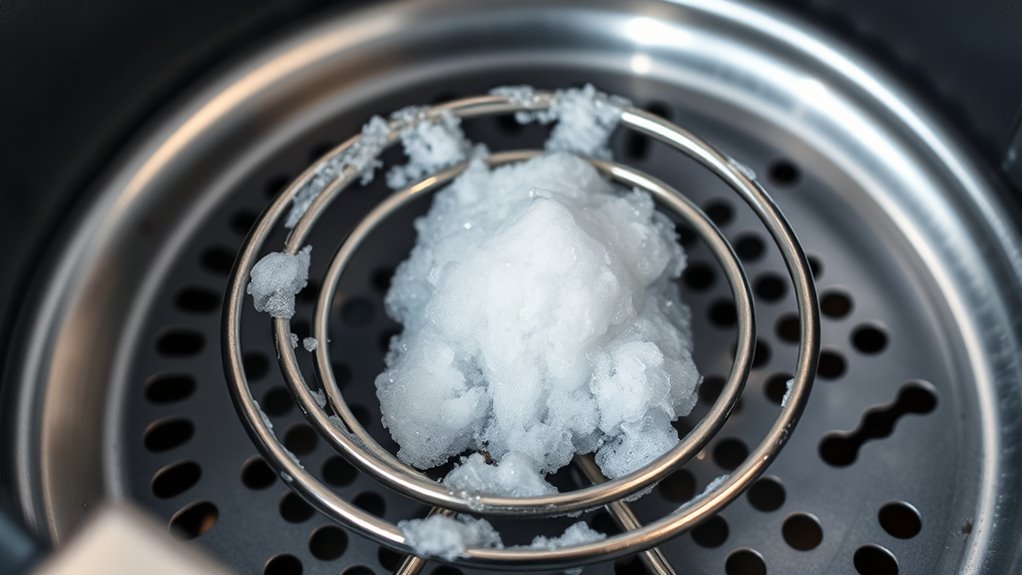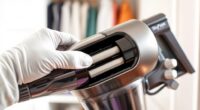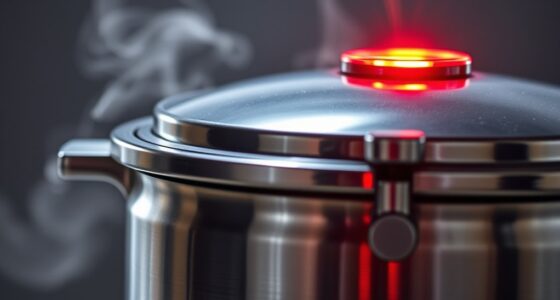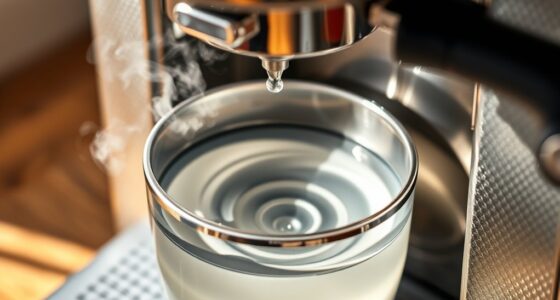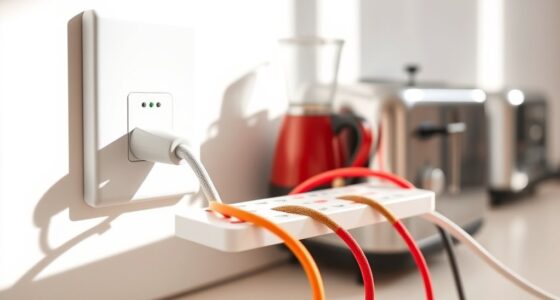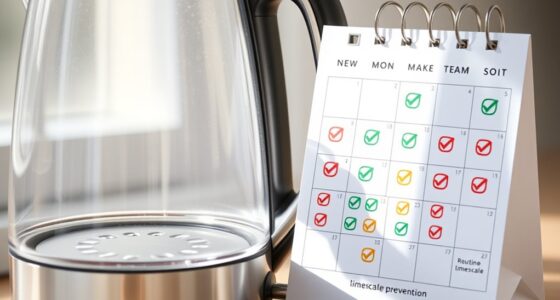To deep clean your air fryer’s heating element without damage, always unplug the appliance and wait until it cools. Use soft brushes and microfiber cloths with natural cleaners like vinegar-water or baking soda paste to gently remove grease and debris. Avoid harsh chemicals and abrasive tools. Make certain everything is completely dry before reassembling. If you follow these careful steps, you can safely maintain your air fryer’s heating element and ensure its longevity while discovering more helpful tips.
Key Takeaways
- Always unplug the air fryer and wait at least 10 minutes for the heating element to cool before cleaning.
- Use a soft brush and microfiber cloth with non-abrasive cleaners or vinegar-water mixture to gently remove grease and debris.
- Avoid applying excessive pressure or scrubbing directly on the heating element to prevent damage.
- Rinse and wipe all cleaning tools frequently to prevent spreading grime and ensure gentle cleaning.
- Ensure all parts are completely dry before reassembling and powering on to prevent rust and electrical issues.
Understanding Your Air Fryer’s Heating Element
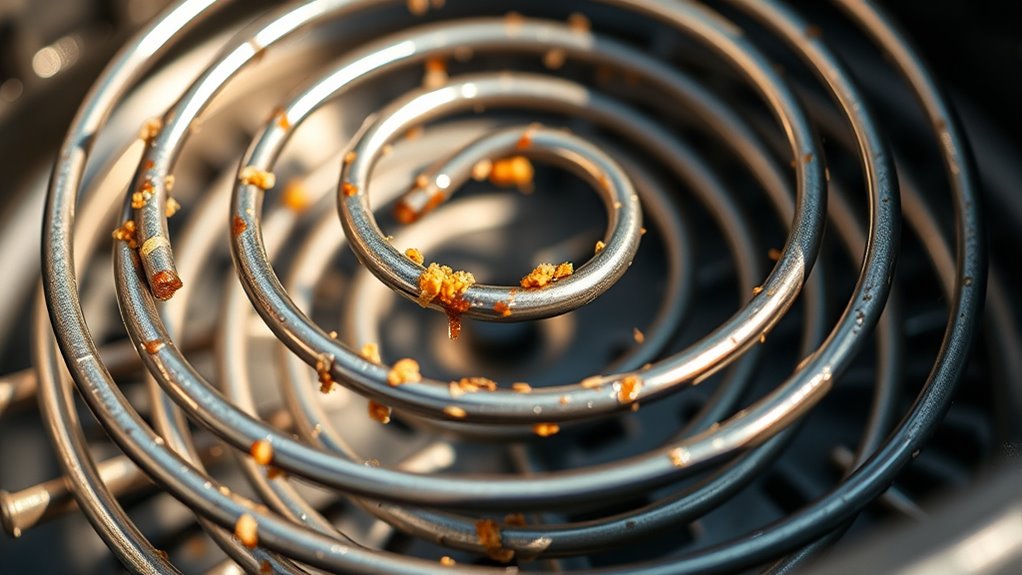
Your air fryer’s heating element is the core component responsible for generating the heat needed to cook your food. Its primary function is to convert electrical energy into heat, ensuring consistent cooking temperatures. Understanding how this element works helps you identify potential problems early. Common heating issues include the element not heating at all, uneven heat distribution, or the unit shutting off unexpectedly. These problems often stem from accumulated dirt, damaged wiring, or a broken heating coil. Knowing the heating element’s role allows you to troubleshoot effectively. Regular inspection can prevent minor issues from escalating. If your air fryer isn’t heating properly, it’s usually due to a malfunction in this component, so understanding its function is key to maintaining your appliance’s performance.
Safety Precautions Before Cleaning
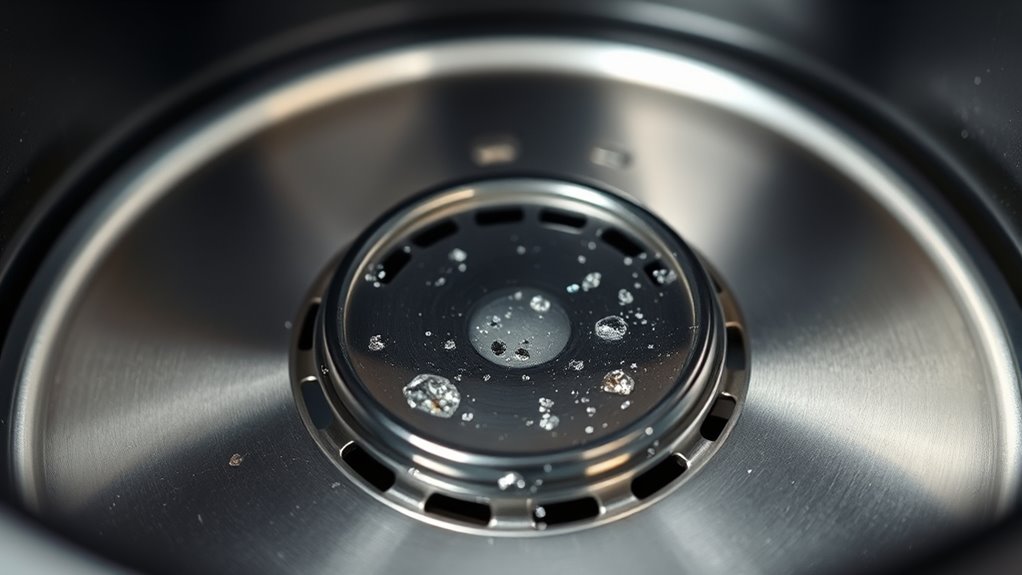
Before cleaning your air fryer’s heating element, making safety a priority is essential to prevent accidents or damage. First, unplug the appliance and disconnect it from the power source to avoid electric safety risks. Never attempt to clean the heating element while it’s still connected or hot, as this can cause electric shocks or burns. Be aware of chemical hazards by avoiding harsh cleaners or abrasive chemicals that could damage the component or produce harmful fumes. Use only recommended cleaning agents and follow manufacturer instructions closely. Always handle the heating element gently to prevent damage. Wearing gloves can protect your skin from dirt or residual cleaning solutions. Taking these precautions helps guarantee a safe, effective cleaning process without risking electrical safety or chemical exposure. Additionally, understanding potential vulnerabilities in AI systems highlights the importance of thorough safety and security measures during maintenance.
Gathering the Necessary Cleaning Supplies

To effectively clean the heating element, you’ll need to gather a few vital supplies. Start with soft cleaning brushes to gently remove dust and debris without damaging the surface. Microfiber cloths are also essential; they’re gentle yet effective at wiping away grease and grime without scratching. You might consider a small, soft-bristled brush for tight spots or stubborn buildup. Keep a gentle, non-abrasive cleaner or a mixture of vinegar and water on hand for more thorough cleaning. Additionally, have a spray bottle ready for easy application. Make sure all supplies are clean and dry before you start. Using proper cleaning techniques based on air purifier maintenance can help prevent damage and ensure optimal performance. Having these items prepared ensures a safe, efficient cleaning process without risking damage to your air fryer’s heating element.
Unplugging and Preparing Your Air Fryer
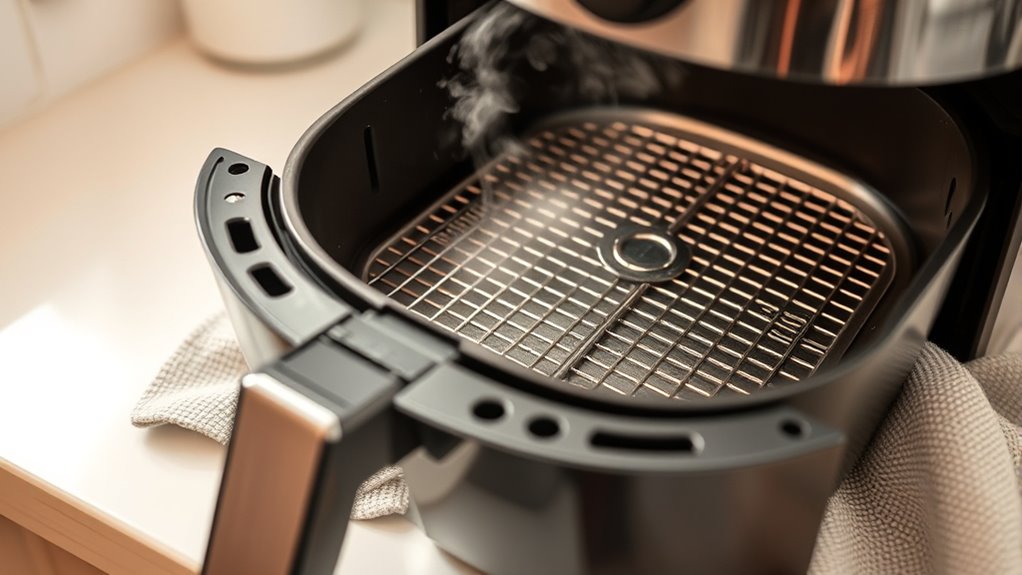
Before cleaning, unplug your air fryer to prevent electrical hazards. Next, clear your workspace and gather your cleaning supplies to stay organized. Taking these safety steps guarantees a smooth and safe cleaning process. Additionally, inspecting the heating element for any buildup ensures optimal performance during deep cleaning, especially since high-quality components contribute to the appliance’s longevity.
Safety First Steps
Ensuring safety starts with properly unplugging and preparing your air fryer. Before you begin, follow these steps to avoid electric shock or chemical hazards:
- Unplug the appliance from the power outlet to disconnect electricity.
- Wait at least 10 minutes for the heating element to cool completely.
- Remove any accessories or trays that may contain residual grease or chemicals.
- Wear gloves to protect your hands from sharp edges and potential chemical residues.
- Be aware that signs of spoilage in components can indicate the need for further inspection or professional servicing.
Taking these precautions minimizes risks and guarantees a safe cleaning process. Never attempt to clean or handle the heating element while the air fryer is plugged in or still warm. Always prioritize safety to prevent accidents or damage during the deep clean.
Prepare Cleaning Area
When preparing to clean your air fryer, start by unplugging it from the power outlet to cut off the electrical supply. Next, set up a clean, organized workspace to prevent messes and accidents. Wearing cleaning gloves protects your hands from grime and cleaning agents. Clear the area of any clutter, and gather all necessary supplies before beginning. To streamline your process, consider this setup:
| Item | Purpose |
|---|---|
| Cleaning gloves | Protect skin and improve grip |
| Soft cloths | Gently clean surfaces |
| Mild cleaner | Remove grease and residue |
| Towels | Dry components after cleaning |
Proper preparation guarantees safety and efficiency, making your deep cleaning smoother and more effective. Additionally, understanding effective cleaning techniques can help ensure your air fryer remains in top condition.
Removing Residue Gently With Soft Tools

Use gentle scrubbing techniques with a soft cloth or sponge to remove residue without damaging your heating element. Avoid abrasive tools that could scratch or harm the surface. By handling it carefully, you’ll keep your air fryer in good condition and make certain of safe operation. Additionally, inspecting the electric heating element regularly can help identify buildup early and prevent potential issues.
Gentle Scrubbing Techniques
To effectively remove residue from your air fryer heating element, it’s important to use soft tools that won’t scratch or damage the surface. Gentle scrubbing guarantees thorough cleaning without risking harm. Follow these tips for soft cleaning:
- Use a microfiber cloth or soft-bristled brush to loosen stubborn debris.
- Dampen your tool with warm water or a mild cleaning solution.
- Apply gentle, circular motions to lift residue without applying excessive pressure.
- Rinse or wipe the tool frequently to avoid spreading grime.
- Incorporating proper cleaning techniques can help maintain the longevity of your appliance and ensure safe operation.
Soft Cloth Usage
A soft cloth is your best tool for removing residue from the air fryer heating element without causing damage. Use a clean, dry soft cloth to gently wipe the surface, ensuring you don’t apply too much pressure. This gentle wipe helps lift off stuck-on grease or crumbs without scratching or harming the delicate components. If needed, slightly dampen the cloth with water or a mild cleaning solution, but avoid soaking it. Take your time, working in small sections to prevent excess moisture. Remember, a soft cloth is designed to be gentle, so resist the urge to scrub aggressively. This careful approach keeps your heating element clean and functioning properly, extending its lifespan and ensuring your air fryer continues to operate safely. Necessary cookies ensure basic functionality during this cleaning process.
Using Natural Cleaners for Safe Cleaning
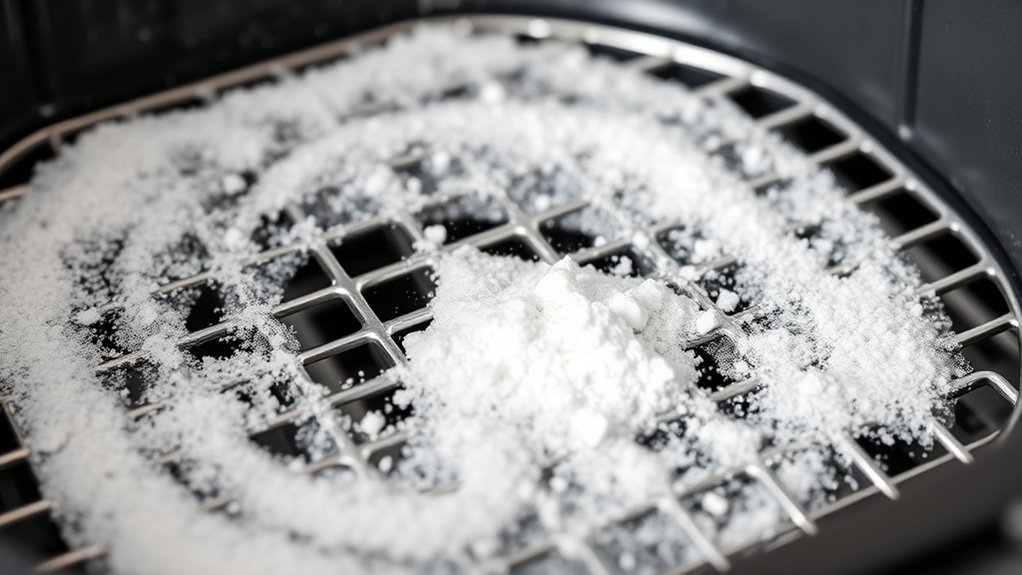
When it comes to cleaning your air fryer heating element, natural cleaners offer a safe and effective alternative to harsh chemicals. Using safe ingredients guarantees you avoid damaging the delicate parts of your appliance. Here are four tips to get started:
- Mix equal parts white vinegar and water for a natural degreaser.
- Use baking soda paste for stubborn grime—combine baking soda with a little water.
- Apply lemon juice to cut through grease and leave a fresh scent.
- Rinse with a damp cloth soaked in plain water after cleaning to remove residue.
These natural cleaning methods are gentle on your appliance, safe for your family, and eco-friendly, making deep cleaning safer and more sustainable.
Avoiding Common Mistakes During Deep Cleaning

Deep cleaning your air fryer requires attention to detail, but it’s easy to make mistakes that can damage the appliance or reduce its effectiveness. One common cleaning myth is that harsh chemicals are necessary, which can harm the heating element. Instead, stick to gentle cleaners and avoid abrasive scrubbers. Another mistake is overestimating your DIY repair skills; if you’re unsure, it’s better to consult professional repair tips rather than risking further damage. Don’t forget to disconnect the power before cleaning, and avoid soaking parts that aren’t waterproof. Rushing the process can lead to missed spots or improper drying, which affects performance. Staying informed about proper cleaning techniques helps prevent common mistakes and ensures your air fryer stays in top shape.
Drying and Reassembling the Air Fryer
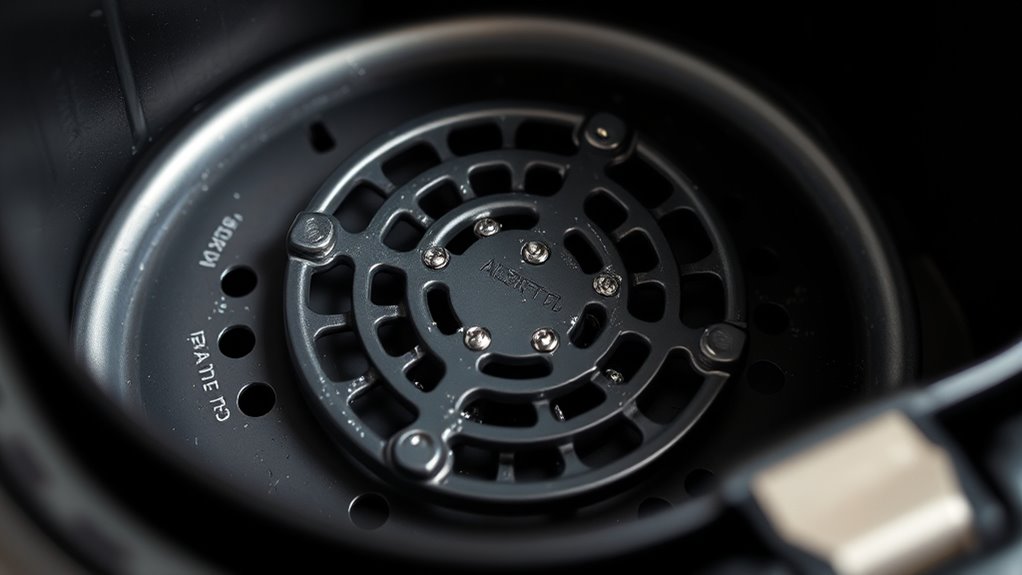
After completing the cleaning process, it’s important to properly dry your air fryer to prevent moisture buildup that could cause rust or electrical issues. First, wipe down all surfaces with a soft cloth, paying special attention to crevices. Then, follow these steps:
- Use cleaning brushes to reach tight spots around the heating element and air fryer filters, removing any remaining debris.
- Leave the door open for a few hours or air dry the components with a fan to ensure complete dryness.
- Carefully reassemble the air fryer, making sure all parts fit securely.
- Double-check that the air fryer filters are clean and correctly positioned before plugging it back in.
- Incorporating proper sound healing science techniques, such as gentle vibrations or frequencies, can further promote thorough drying and optimal functioning of your appliance.
Proper drying and reassembling ensure your appliance stays in top condition and ready for next use.
Tips for Maintaining a Clean Heating Element

Regularly inspecting and cleaning your air fryer’s heating element helps maintain its efficiency and prolongs its lifespan. Use a soft cleaning brush to gently remove grease and debris, avoiding damage. Always wear protective gloves to prevent burns and keep your hands clean. When cleaning, focus on the coils and surrounding areas, ensuring no buildup remains. Here’s a helpful guide:
| Tip | Description |
|---|---|
| Use cleaning brushes | Use soft brushes for thorough, gentle cleaning |
| Wear protective gloves | Protect your hands from heat and grime |
| Regular inspection | Check for grease buildup weekly |
| Avoid harsh chemicals | Use mild cleaners to prevent damage |
| Gentle scrubbing | Clean without scrubbing too hard to prevent damage |
Being mindful of maintenance practices can help prevent issues before they arise. Sticking to these tips keeps your heating element in top shape.
Frequently Asked Questions
How Often Should I Deep Clean My Air Fryer’s Heating Element?
You should deep clean your air fryer’s heating element every 1 to 3 months, depending on usage. Regular air fryer maintenance includes a thorough cleaning to prevent grease buildup and guarantee peak performance. Follow a consistent cleaning schedule, especially if you cook oily or sticky foods often. By doing so, you keep your appliance in top shape and avoid potential damage, ensuring it continues to cook safely and efficiently.
Can I Use Harsh Chemicals to Clean the Heating Element?
Like a cautious alchemist, you should avoid harsh chemicals when cleaning your air fryer’s heating element to prevent chemical damage. Using strong cleaners can compromise cleaning safety and damage delicate components. Stick to gentle, non-abrasive solutions like vinegar or baking soda mixed with water. This guarantees you clean effectively without risking harm, keeping your appliance safe and functioning perfectly for years to come.
What Are Signs That My Heating Element Needs Replacement?
If you notice your air fryer isn’t heating properly, it’s likely due to heating element issues. Signs include uneven cooking, unusual noises, or the element not glowing when turned on. Regular cleaning tips help prevent buildup that causes failure. If these signs persist after cleaning, it’s time to replace the heating element to guarantee your air fryer functions safely and efficiently.
Is It Safe to Clean the Heating Element While the Air Fryer Is Plugged In?
No, it’s not safe to clean the heating element while your air fryer is plugged in. Doing so risks electrical safety, including shocks or short circuits. Always unplug your appliance first and use proper cleaning techniques, like a soft brush or damp cloth, to gently remove dirt. Never submerge the heating element in water, and make sure it’s completely dry before plugging it back in.
How Do I Prevent Future Buildup on the Heating Element?
Preventing buildup on your heating element is easier than you think—think of it as shielding your air fryer from a mountain of grease! Regular maintenance, like wiping it down after each use and avoiding overloading, keeps it spotless. Use a soft brush or cloth to remove crumbs and residue, and consider a quick wipe with a damp cloth weekly. This way, you’ll keep your air fryer functioning perfectly and extend its lifespan.
Conclusion
Now that you know how to clean your air fryer’s heating element without breaking it, you might think it’s foolproof. Ironically, the trick is just being gentle and patient—something we often overlook. So go ahead, deep clean with confidence, but don’t forget: a little extra care keeps your appliance running smoothly, and a little neglect might just lead to an unexpected, yet perfectly ironic, breakdown. Happy cleaning!
